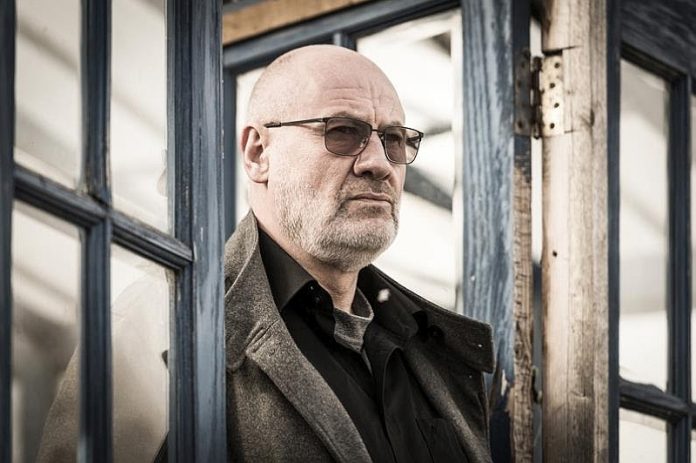HIT CHANNEL EXCLUSIVE INTERVIEW: March 2020. He had the great honour to talk with a legendary singer: Fish. He released four albums with Marillion in the ‘80s and since 1990 he has a remarkable solo career, releasing excellent albums such as “Vigil in a Wilderness of Mirrors”, “Sunsets on Empire” and “A Feast of Consequences”. On 13 March he released the “Weltschmertz” from the upcoming album of the same name. Fish is not only a gifted singer and lyricist, but also an amazing conversationalist. Read below the very interesting words he told us:
 On 13 March you released “Weltschmertz” single and video. Are you satisfied with the response you got so far for this?
On 13 March you released “Weltschmertz” single and video. Are you satisfied with the response you got so far for this?
Yes, that’s right. I mean, this is strange. It’s weird to be putting out a single with a song like “Weltschmertz”, which is more about the zeitgeist. The track, in a way, seems to fit the times perfectly. It’s going well. I am not signed to a major recording company, so I don’t have the promotional resources that they have. We always look at things as being kind of slow, we move very slowly. We don’t expect fireworks, you know.
“Weltschmertz” means “pain of the world”. What influenced you to write this very relevant song?
Switching on the TV. The idea for the album came up in 2015 when my wife, Simone, was living in Germany at the time. We weren’t married and I was living in Edinburgh, so I was spending a lot of time in Germany and I speak a little bit of German and I love the country. Like I said, I spent a lot of time there and I was watching the news on a laptop and I was very aware of changing issues. I didn’t want to write about corporations, big banks and big businesses, there are so many people that have done that before. They can be a kind of cliché. I wanted to try to take it from characters. I wanted to do observational writing, so I was thinking how characters would be in the world situation, rather than taking an overall, big global perspective. As the album developed, as you know, it has taken a long time and things changed through the years. The idea for the title came in 2015. In 2016, my father died and that changed my attitude towards life and my family. I should say, I thought that I would be able to deal with that better. I walked up in the garden several months later and I didn’t know where the time had gone. It hit me a lot harder than I ever thought it would. That was a big inspiration behind the track “Man with a Stick”. It’s on the “A Parley with Angels” (ed: EP -2018) album, which is very much inspired by my father’s death. The time went by and the President in America changed, the world have changed, then earthquakes happened and fires happened, Syria was bombed and through all that time I had sepsis twice, and last year it took me off for three-four months. I had sepsis… and now we ‘ve got Covid-19. With all that, the album capitulated over a long period of time and obviously the world was changing so fast and has become a very different place and that’s what the album is about: It’s about the world we all live in. It’s very much an album for our times. All the subject matters have to do with issues and problems that the people deal with, every day.
How much did the coronavirus affect your plans? I saw that you rescheduled your tour dates for February 2021.
The severity and the impact of Covid-19 has taken everyone by surprise. When we started rehearsals about three-four weeks ago -it wasn’t a month ago- we were very aware that it was going to change the way we tour and we prepared for in a way that we didn’t think it would come so fast. I was watching it to go from China to jump through Iran and then to Italy. The impact that had in Europe was incredible. I lost the 12-date UK tour. It was only 12 shows. It makes you rethink. Like a lot of people, I’m in my house now, with my wife. I’m very-very lucky that I don’t live in a flat in Naples or a box in Barcelona. I ‘ve got a garden here and we have been growing a lot of foods for a long time, so I am constantly in the garden and I think the music can stay back a little bit. The album is moved from the original intended release of July, we’ve got to move it back to September, because it’s just the wrong time. Now, I’m doing more things like this: I’m doing interviews with people on the phone or Skype and I’m working more on the Internet than I would normally do at this stage. I feel bad, I feel sorry for the musicians and the crew. Nobody can move. It’s the same for musicians, bands and crews all over the world now. Everybody is just in limbo. This is a big change in our plans, in the societies and the cultures. It’s a big change.
 It seems that you are very proud of “Rose of Damascus” from the upcoming “Weltschmertz” album. How challenging was it for you to write its lyrics?
It seems that you are very proud of “Rose of Damascus” from the upcoming “Weltschmertz” album. How challenging was it for you to write its lyrics?
I saw an article of a news programme on Channel 4 that I really liked. One of the films that popped out on the news was “The gardener of Aleppo” . It was a film about a person who was trying to keep his life as normal as possible. He ran a nursery and he grew plants in Aleppo. The green roundabouts in Aleppo were very famous for having flowers. Of course, the Damask Rose is very famous and there is an interview with this guy. There is one part of the interview where he was asked how he deal with the sound of the rockets and the shellfire and he said: “All I hear is Beethoven”. I had to write about this and I started to research about Syria, the revolution and during a part of the research I came across a story about how the Damask Rose became one of the most important roses in the rose cultivation in Europe. It’s one of the better roses. It’s a rose that, as you know, is famous for its perfume, for its oil. It said that the Damask Rose is really extinct because it grows in areas where a lot of the warfare was going on, so people are not picking the roses and the roses are unattended.
Also, I read a story about how the rose came to Europe: A French knight in 13th-14th century picked up a rose from the walls of the City of Damascus and he took it back with him to France and that’s how the Damask Rose became one of the primary types of roses as we know them in Europe. I thought that was a really interesting idea and I wanted to approach a song about that, in a different way. So, I started to write about a young teenage girl who was growing up like a young teenage girl and she was embracing western culture in Syria and the things were changing. She was called up in the revolution and things happened and she ended up in a city where she lost her family and nobody left. She had to go and somehow she comes across a rose in a balcony in a blown up neighbourbood and she takes the rose because it’s the only thing of beauty she could see. Then, she edged towards Aleppo, edged towards the sea and edged towards Europe. That’s the story. It’s like a film. It’s more like a screenplay, than lyrics.
Why did you decide to retire after “Weltschmertz” and its subsequent tour?
Well, I am not retiring after the “Weltschmertz” tour. Things have changed that. Originally, I was gonna finish my touring history in 2021-22, but things have just changed so much. We have no idea where is this going. I ‘ll be on the road for a little bit longer. As an album, this is definitely my final album. I always said that I wanted to leave the solo career with the best album that I have ever made and that’s what I ‘ll do. In the same way, when I left Marillion, I had the “Clutching at Straws” (1987) album, which I thought it was the best album we did together. That album, is a great album to leave that band on, because everybody wanted to know what we were going to do next. And that’s what I want to do with my solo career. I want to make that album that people would say: “What is he going to do next?” So, it’s not leaving at a low point. The thing is, I’m a writer who can sing and not a singer who can write and there is a big difference in that. I love words, I don’t play an instrument, I don’t really understand music. Somebody plays a rhythm or a melody or plays chords on a guitar or keyboards and I can find the words and I can write songs. But I’m a writer and I love words. I have a great time in music industry, but it has changed so much. Nowadays, the current music is so difficult to sell. Everybody downloads, mostly there are illegal downloads and it’s difficult to make a living from the current music. If you want to make a living, you have to go and play live and I’m 62 years old this year. I decided that I don’t want to spend the rest of my life on a tour bus. I am a realist and I know that I am never gonna play arenas. I am gonna be at the level that I am forever. I don’t want to do that. I ‘ve got a garden, I’ve got a wife, I’ve got my imagination, I’ve got a drive and a desire to write something more than just lyrics. Music can become very restrictive, very constraining by the words. I want to fly a little bit more, you know.
 Did you read a lot of books about the WW1 before writing the “High Wood Suite” on “A Feast of Consequences”(2013) album?
Did you read a lot of books about the WW1 before writing the “High Wood Suite” on “A Feast of Consequences”(2013) album?
Absolutely! In the same way as the “Weltschmertz”, I researched. I don’t take things lightly. I ‘ve just said and explained to you the “Rose of Damascus”. I didn’t just say: “Well, I ‘ll write a song about somebody who is gonna be a refugee”. Let’s study, let’s find out what happened, what she was living with, the situation she was in. I watched the news articles and I read a lot of articles on the Internet. The same with the “High Wood”. I mean, there are so many heavy metal bands that have dealt with the WW1 and have written songs about explosions. I didn’t want to do that. I wanted to think it from a completely different perspective and I spent a lot of time researching, reading people’s memoirs, reading poetry from Siegfried Sassoon and Wilfred Owen, reading history books. I was inspired by the fact that I went across to the Somme on my birthday and I was there in the evening where my grandfather fought in the trenches. That really hit me very hard and that inspired me originally to write what was just gonna be one song, but it moved and it changed and that’s why it basically became five songs within a suite. I am very-very proud of what I achieved with that. I think I captured that and there are a couple of famous historians who heard the “High Wood” suite and wrote that it really captures the time. I do a lot of research. I don’t just make things rhyme and fit the words into the song with a hammer. Lyrics is what I really bring to the music and I’m lucky that I have a great bass player and a great colleague, he’s not just a bass player, he’s a multi-instrumentalist, Steve Vantsis whose, by the way, grandfather is Greek. Steve has been with me since the “13th Star” (2007) album and we have a great understanding and a really great writing partnership. He understands what I try to do, so I would tell him a story: “This is what I am wanting to do” very much in the same way I used to work with Steve Rothery (ed: Marillion -guitar) back in the early ‘80s. “This is the story. This is what I want. This is the feel”. It’s like a soundtrack for a movie. But more than a soundtrack. It’s the way, the interaction between the lyrics and the melody in the song structure that I think it’s my style.
What is the secret of your lasting friendship and collaboration with Steve Vantsis (bass)?
He had never written before and he was very ambitious. He had never written music before “13th Star” and when he and everyone else came with me in the “13th Star”, it was a very difficult time for me, personally. It was a very emotional time for me. The songs had to fight my way through that and get rid of a lot of shit that was in my life at the time. We got together and… there was a lot of friction at the end of that album. But it was good. We were finding where we were. We were discovering our positions within our relationship. He had left the band after the “13th Star” tour for a while and he came back on “A Feast of Consequences”, and when he came back, we had a far better understanding of each other. The space that there was, was wanted within our songwriting and the control room in the studio. I think he also understood me a lot more and I understood him a lot more and on “Weltschmertz” he has been very patient. At this stage, there have been a lot of things happened during the writing period of that album for both of us. It made us stick together and I can say that he’s one of my closest friends.
Do you have happy memories of your collaboration with Steven Wilson who produced “Sunsets on Empire” (1997) album?
Yes! I mean, Steven and I, we are in contact. Strangely enough, I just got an email from Steven today (ed: 23 March). He actually wrote to me to say how much he liked the “Weltschmertz” track, which I though it was really nice of him. We had a great collaboration on “Sunsets on Empire” and it was very much in a same way as with Steve Vantsis, when we got together on “13th Star”. Steven never wrote for anybody else before and when he brought his ideas to the table, it was like: “Can I take the band and prove my thing with them?” He was quite surprised at the end because I was left up here and I worked with other people -especially on the vocals, I worked with Avril Mackintosh- and he didn’t realize that it was going to go in that direction, but he liked the “Sunsets on Empire”. He’s great, it was a great collaboration and I think it benefited both of us. It was a good project for both of us, because I worked with somebody that I had never worked with before. It was a very different experience and it was the same for him. He went out to do his thing and I went out to do my thing. We both learned a lot from that project.
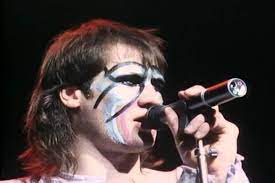 Your cover to “Five Years” (David Bowie) is one of the best of all time. What does this song mean to you?
Your cover to “Five Years” (David Bowie) is one of the best of all time. What does this song mean to you?
I made that recording because I was thinking a lot about the period of my life when I was 22 and there was a complete remake of the “Script for a Jester’s Tear” (1983). In 1993, when I decided to do “Songs from the Mirror”, I was in a very difficult period in my life because I left Polydor Records, I was independent at that point and “Five Years” for me was a song that I always associated it with Aylesbury where Bowie did his first concerts at the Friars Club in Aylesbury. Five years is a standard length of a record contract or a management contract and I always felt that the song was about how he came into the business and started to become famous. It was about his struggle with fame and with the men outside the music in his life. I found out that it has great observational lyrics, those are the lyrics I love. It’s one of my favourite songs. There is a little story: When we were recording the album, we actually find out that David Bowie, who was a big collector of art, was in Edinburgh and not only in Edinburgh, he was at an art gallery only 5 miles away from the studio. We tried to contact his management in New York because we knew that David was a great saxophone player and we wanted him to play saxophone on the track. We spent about three hours that afternoon trying to chase him down and see if we get him to play saxophone, but obviously we never found him, which was a shame because that would have been a great collaboration.
What made you to change your mind about music streaming services?
I ‘ve just been aware of the people who won’t buy the current product. Like I said, most musicians nowadays depend on playing live to make an income, to make a living. Somebody told me: “OK, people might not buy your album, but they might come across it on a streaming service. You may not make an income from streaming but you may be selling concert tickets, as people become aware of you through streaming, then you ‘ll still be in”. Somebody who streams and then buys an album, then great, but it doesn’t seem to work that much. It’s interesting because on Spotify I’ve got 50.000 followers which to a lot of artists, isn’t very much. If those 50.000 people that stream my albums on Spotify actually bought the album, it would make my life a lot easier.
Do you regret not playing in “Braveheart” (1995) film?
Good question. Again, I’m a realist. I was never a major player. In 1985-86 when a lot of people knew me, there were a lot of films I had been asked about. The problem was, I was in a band and if I would want to do a movie, then I would be two months away from the band and the band couldn’t work and tour. The management wasn’t really into the idea of me having an acting career. I was never gonna play a lead, I was never gonna get big parts. I was always in supporting acting roles. When you are a supporting actor, you go for the audition and then you have to wait for two months to decide whether they are going to have you in the movie or not. Then you have to wait until the movie is shot. When I am booking a tour, I am booking 9-10 months ahead. “Braveheart” was one of the movies that came up right in the middle of the “Suits” (1994) promotion and tour. At the time, I was independent, I had no backing from a major recording company and I was depending completely on making albums and touring and the “Braveheart” movie came up, just at the wrong time. I went down to London and met Mel Gibson and I spent a day with Mel Gibson, talking about the movie and they wanted me to play his brother. I had to be a lot shorter, I tried to bend my legs a little bit (laughs). I was a lot taller than Mel and I think that was one of the problems. They told me: “We’ve got another role, because we want you to be in the movie”. I said: “I can’t. I can’t just come out and do as much as I really want to do in the movie”. I was completely committed to working with the “Suits” album and go on a tour at the time, so I had to tell them “No”. It’s a very interesting movie. I mean, it’s very historically inaccurate. It’s a very emotional movie, but as a Scotsman when I am looking at it, it’s been great in some ways and bad in others.
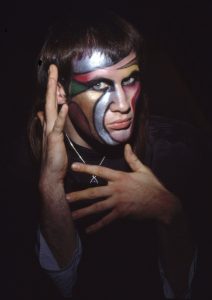 Had you realised how uncool it was in the ‘80s to love progressive rock?
Had you realised how uncool it was in the ‘80s to love progressive rock?
Sure, it was uncool. When Marillion started in 1982, progressive rock should have been dead and buried. That’s what the entire new wave/pop movement should have done as far as the British media were concerned. We proved that there was still an audience out there. I didn’t care just because somebody says: “This is uncool”. I’ve never been a cool person, since I was a kid or a teenager. I saw a lot of fans of Bowie, T. Rex and Slade, the whole glam rock thing and I could never do it because I was always too tall, too big to fit in the clothes. I could never wear decent clothes, I was always in black suits. I couldn’t even find a caftan in my size.
Is Mark Wilkinson to you and Marillion what Storm Thorgerson was to Pink Floyd?
I wouldn’t say Storm, I would say probably Roger Dean and Yes, more than anything else. Mark and I, we’ve got a great relationship. On the “Weltschmertz” album, we communicate right from the start. I gave him my demos, I sent him lyrics and ideas and we talked a lot about the album. Mark of course does a lot of things. In “Weltschmertz” he would come up with things and I might tell him: “That’s not really what I saw it going”. We insinuate each other, very much like Steve Vantsis and I. That’s why I like working with creative people, I’m insinuative.
How emotional was it for you to play “Market Square Heroes” (Marillion single -1982) with your former bandmates at the Market Square in Aylesbury in August 2007?
That was a crazy thing. That was completely crazy. We go back to “Five Years”, to David Bowie (he sings): “Pushing through the Market Square” etc… and the Market Square was always a place I wanted to play and they used to do concerts there, back in the late ‘70s. It was a brilliant place to play a live and back then I got an offer to play the Market Square and I thought: “This is fantastic. Finally, I am gonna play the Market Square”. I went to see Marillion in Glasgow. There are a lot of people who think that Marillion and I, we are kind of sworn enemies, that we would have a big problem. No, Ian Mosley (drums) and I, we talk irregularly. The same with Mark Kelly (keyboards) and I, and we would meet up. We were all friends, we shared a lot of great times in our lives together. We did a lot of things. If we hadn’t got together, then I wouldn’t even be here talking to you on the phone. I went to see them in Glasgow and we were talking after the show and I said to Mark if they would fancy to come up and play. I think he mentioned it to Steve (ed: Rothery -guitar): “Do we come over?” I said: “I am not talking about it in the press, I’m not advertising this, if we do it, let’s just do it as a big surprise”. Suddenly, everybody agreed: Mark, Ian, Steve and Pete (ed: Trewawas -bass) and they said: “Yes, that’s good. Let’s do one song. Let’s do “Market Square” just for a laugh in Aylesbury” and we couldn’t believe the press that came of that. The next day, when I woke up, it was nuts. The entire Internet was full of rumours: “Are they getting back together again?” etc. All it was, was just five guys get together and have a laugh. That’s the problem nowadays with the press and the media: You can’t do anything without people making more than it actually is. It was a great time, although it was a terrible version of “Market Square” that I sang on that day, but for everybody there it was a very special day because they could see myself with the other four guys.
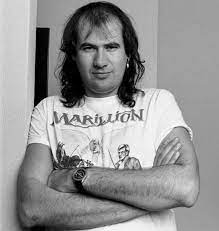 Did you expect the commercial success of the “Kayleigh” (1985) single?
Did you expect the commercial success of the “Kayleigh” (1985) single?
I knew it was a hit single. I didn’t realise it was gonna be that big one. It’s a song I’m very proud of. It’s a great song and it’s interesting because I did an interview with a big Dutch TV programme for a New Year transmission and it was the first time I ever talked about Kay Lee who was the girl who was the song about. It still means a lot. Again, like all of us -you and me and everybody out there- we all have songs that mean something special at some time in our lives and that song meant a lot to a lot of people in their lives and meant a lot to me at the time. The words was a very important thing for me to write at the time. I’m very proud of that song. I don’t play it all the time. I think there have been songs that they are equally as good as “Kayleigh”, but they were never heard: “A Gentleman’s Excuse Me” from “Vigil in a Wilderness of Mirrors” (1990) album, which is 30 years old this year; “Just Good Friends” from “Internal Exile” (1991) album, I think it’s great. There is a song on “Weltschmertz” called “Garden of Remembrance” and if I was on a major record company, it would be a hit. In “Keyleigh”, we had the mighty EMI machine behind us and they could get you into radios that nobody else could get you into. They could get you radio plays, they could get you on the TV shows. As an independent artist now, I don’t have that kind of back-up. But I try to write songs as best as I can and if somebody picks up them, then great. I still think “Weltschmertz” as a track, as a single on its own. It is gonna reach a lot of people in the next month, two months, because of its subject matter. I mean, I don’t think it’s gonna be a hit, but I think it’s gonna reach people. I don’t know what is on the charts. I can’t tell you who is #1 on the albums charts or the singles charts. I’ve got no interest in that. I don’t release albums to try to have chart success.
I release albums because I want to write and I get great satisfaction from writing. If I wanted to just put out some plastic, I could have three albums between “A Feast of Consequences” and “Weltschmertz”. I want to do something that I’m proud of, I think it’s right for the time, I do it to the best of my ability, something that I would like to see. Money is not something that rules my life. It never has. I just came here to do this interview, I was out cleaning garage and the garden. What is important for me again was garage, you know, for obvious reasons. The most expensive thing I buy on a yearly basis is a season ticket for Hibernian Football Club. I don’t have an expensive lifestyle, I don’t carry security, I don’t stay in 5 star hotels, I don’t travel that much. The last time my wife and I, we went on a holiday was on our honeymoon in 2017. We should have been in Spain next week for a week but all the flights were canceled. As I said, money was not the reason I got into the music industry; it’s not the bee on the meadow. When I make an album, people say: “What’s the budget?” and I reply: “I don’t really have a budget. This sounds good. How much does it cost? If I can afford it, let’s do it”. That’s the way I look at it. If I was on a major record company, I’m sure there would be a guy in the A&R, that he would say: “We can’t afford strings. We don’t want to pay for strings. We don’t want to pay for real brass players”. As an independent artist making an album, I can do what I want. I can put the album out when I want, when it’s ready. If I was on Warner, for example, and I had to release an album two years ago, they would say: “Unless you make the album, there will be no money”. As long as I can find some money from touring or whatever, from selling T-shirts on the http://fishmusic.scot/ website, then it’s great. That will pay for the brass section, that will pay for the wood player on “Rose of Damascus”. That’s what I do. I’ll never be a millionaire, I’ve got no great desire to be a millionaire. Sometimes, I look at things and if you ‘ve got too much money, it brings you too many bloody problems. I’ll survive, which is great, and I think in this day and age, that’s a pretty good thing.
Do you have happy memories of the 1987 Marillion concert at Wembley Arena when Bruce Dickinson, Janick Gers and Jimmy Bain (Dio) joined you on “With a Little Help from My Friends” (The Beatles)?
Yeah, that was a good vibe! It was a bit of fun. At that time, the band was breaking up and I didn’t like to play the big arenas. I like playing to people. When you go to arena size and you’ve got the big spotlights in your face, you don’t really play to people. You are playing a wall. I think Roger Waters covered that idea pretty well. At that time, at Wembley, I had some great times. Playing “With a Little Help from My Friends” was wonderful. Of course, Janick Gers came and played for me on the “Vigil” album and we wrote “View from the Hill” together, which I thought was very good.
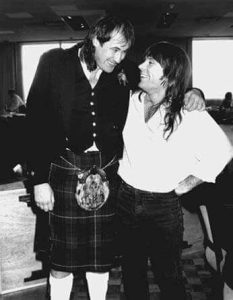 You had the opportunity to meet Keith Emerson at Tony Stratton-Smith’s (boss of Charisma Records and manager of The Nice, Genesis and Van der Graaf Generator) funeral and then you went to a bar with him. What was it like to meet one of your heroes?
You had the opportunity to meet Keith Emerson at Tony Stratton-Smith’s (boss of Charisma Records and manager of The Nice, Genesis and Van der Graaf Generator) funeral and then you went to a bar with him. What was it like to meet one of your heroes?
That was surely a very emotional day because Tony Stratton-Smith was a friend of mine. He played a big part in bringing Marillion to people’s attention. I met Keith, Alan Hull from Lindisfarne and the people from Monty Python, as well. It was a very strange day, a very emotional day and a very drunken day in the end. We were up till very late.
How much impact did the Premiata Forneria Marconi concert for the “Chocolate Kings” tour at Leith Theatre in Edinburgh in April 1976 have on you as a young fan?
It’s strange (laughs). In the bathroom, I ‘ve got two picture frames and they ‘ve got all the tickets of all the gigs I went to. I traveled, I moved around a lot in the ‘80s and a lot of things were lost in the way. One thing that I kept, was a little plastic box that I’ve got all my concert tickets from all the gigs: from my first Genesis gig, my first Yes gig, tickets from a band called Druid and then there was PFM. I remember the ticket was really cheap. The reason I went to PFM was because Emerson, Lake & Palmer signed them to their new Manticore label. I had the “Photos of Ghosts” (1973) album and I thought that was absolutely brilliant. When they came to Edinburgh, I went to see them and they were totally amazing. I’m very lucky that I’ve got to be friends with some of the guys through the years. They asked me to work with them and do some songs on one of their albums, two albums ago, but I was so busy and I just couldn’t do it. I really like “Photos of Ghosts”. It’s an album I still play in the house. I love the album and I have both the Italian (ed: “Per un amico” -1972) version and the English version.
Is it frustrating when some journalists compare you with Peter Gabriel?
No, I don’t think I sound like Peter Gabriel.
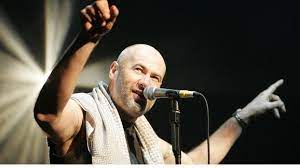 Do you remember your concert in Athens in 2008?
Do you remember your concert in Athens in 2008?
Yes, that was an amazing time. We had been trying to get to Greece for a long-long time and ironically that was at the time Steve Vantsis had left the band, because his family comes from Thessalonica. We played in Athens and the bus stopped there in our way to Bulgaria and we ended up staying for 5 days in Thessalonica and he wasn’t there with me. He was always saying: “My Greek family, my Greek family” but he would left the band then. But I loved the gig. It was a very emotional gig. I don’t know why we just never got the offers to come back to Greece, so I was very disappointed. We did a fantastic show, but as always, the same with Italy, I’ll never get the chance to play Italy these days because promoters don’t come up with the money. It’s not the fact that I want silly money, I need enough money just to pay the wages for my band and crew, pay for the bus, the hotels and to make some money for myself. Most of the money that we get from gigs nowadays doesn’t even pay that. If I had one million Euros, I’m sure I would be able to play places that I really want to play with my band. The problem is to go there and pay the fares across, but it’s expensive. We had a fantastic time there, but I was disappointed that we never got a chance to go back.
Was it an interesting experience to record “Time and a Word” with Steve Howe (Yes guitarist) in 1993?
That was really crazy because if somebody told me when I was 17-18 years old -while I was a Yes fan- that one day Steve Howe would come up here to play “Time and a Word” for me for an album, I wouldn’t believe him. It would have been impossible. But it happened. It was good. He did a wonderful work. I remember picking him up from the Edinburgh railway station and I’ve never seen a man with so many guitars on a trolley.
A huge “THANK YOU” to Mr. Derek W. Dick for his time.
Watch “Weltschmertz” video: https://www.youtube.com/watch?v=0MGDh6qh-0k&list=RD0MGDh6qh-0k&start_radio=1&t=9
Official Fish website: http://fishmusic.scot/
Official Fish Facebook page: https://www.facebook.com/derek.dick/


